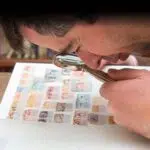Philately Week is celebrated in the last week of November to promote the significance of philately to the arts, culture, science, and international relations. This year, it is held from November 23 to November 29. Did you know that the field and hobby of philately have been in existence for over 150 years? Philately is the study and collection of postage stamps, postcards, postmarks, and other materials relating to postal delivery. It also refers to the appreciation and research of these materials. Philately is viewed by many as the world’s oldest formal collecting hobby. It’s practiced in every country that issues postage stamps and is mainly popular in the U.S., Germany, France, and the United Kingdom.
History of Philatelic Week
The origin of philately can be traced to 1840 when the English post office introduced postage stamps. The postage stamps were an idea by Rowland Hill, who proposed in his 1937 pamphlet “Post Office Reform: Its Importance and Practicability” as a solution to the revenue problem the post office in Great Britain was experiencing. The Exchequer supported this proposal, and on May 1, 1840, a one-penny design in black and a two-penny one in blue with the profile of Queen Victoria went on public sale. In 1841, the earliest reference to stamp collecting was recorded when a lady placed an advertisement in The Times of London, looking to cover her dressing-room with canceled postage stamps.
Later on, between 1842 and 1843, New York City, the Brazilian empire, and the Swiss cantons of Zurich and Geneva started issuing stamps. In 1847, the U.S. government issued stamps of 5-cent and 10-cent, bearing the pictures of Benjamin Franklin and George Washington, respectively. As of 1850, most countries in the world had begun issuing postage stamps. It was around the 1850s that philately took off.
The person considered to be the first philatelist is Mansen, a postmaster who lived in Paris. In 1855, Mansen sold his stamp collection to the stamp merchant and second-hand book dealer Edard de Laplante. Following the sales of this valuable collection, many stamp merchants started to emerge.
In the late 19th century, individuals worldwide and countries began collecting stamps. Countries like England, Germany, France, and Belgium created mechanisms to collect stamps. Also, some of these countries established museums dedicated to their history with philately.
In 1934, German philatelist Hans von Rudolphi suggested the idea of celebrating an annual Postage Stamp Day. The idea was quickly adopted in Germany, and other countries later established their Stamp Day. On October 13, 1969, President Ferdinand E. Marcos of the Philippines proclaimed the last week of November as Philatelic Week.
Philatelic Week timeline
Great Britain’s Post Office puts the black one-penny and the blue two-penny stamps bearing Queen Victoria’s profile on sale.
Ten years after the introduction of stamps in Great Britain, most countries start issuing them.
German philatelist Hans von Rudolphi introduces the idea of celebrating Postage Stamp Day.
President Ferdinand E. Marcos proclaims the last week of November as Philatelic Week.
Philatelic Week FAQs
Is philately still popular?
The number of people engaging in philately has dipped as people have taken to sending emails rather than physical mails. However, philately has consistently remained one of the most popular hobbies in the world. Plus, it’s slowly gaining more popularity among millennials.
Who came up with the word philately?
The word “philately” is the English transliteration of the French ‘philatélie,’ coined by Georges Herpin in 1864.
What is the most valuable stamp?
The British Guiana 1c magenta is considered the most valuable and famous rare stamp globally. Only one specimen is now known to exist, and it’s valued at $8,307,000.
Philatelic Week Activities
Collect your first postage stamps
You need to first decide the types of stamps you want to collect. These could be stamps related to currencies, places, or people. While it’s okay to be a generalist, focusing on a specific niche allows you to create a more exciting stamp collection. You can get stamps at your local post office, U.P.S. stores, stationery stores, or online on Amazon or eBay.
Join a philatelist community
If you have been collecting stamps on your own, now is the time to link up with other philatelists. You can check with your local post office or platforms like Facebook for philatelist groups in your area.
Attend a philatelist event
If you are interested in meeting other philatelists and showcasing your stamp collection, you can attend a philatelist event. Facebook and Stampworld.com are places where you can get details about such events.
5 Interesting Facts About Philately
An audio postage stamp
Bhutan once issued a stamp that plays its national anthem when it’s put on a record player.
The Shakespeare factor
William Shakespeare is the first non-royal to appear on U.K. postage stamps.
Chocolate stamps
Belgium once issued stamps that smelt and had a chocolate taste.
The world’s highest post office
A post office in Hikkim village, India, is the highest post office in the world, situated at an elevation of 14,400 feet.
The world’s smallest post office
Ochopee post office in Florida, U.S., is the smallest post office in the world, covering 61.3 square feet.
Why We Love Philatelic Week
Philately is important to arts and culture
Postage stamps are a window to the past, a small piece of history. They tell the state of the country at the time they were issued and pass across the emotions and ideas of that period. Collecting these stamps enables philatelists to preserve the past, create a connection to a shared history, and also keep the memories of some of the most extraordinary people in history.
Philately is fun
Collecting and studying stamps are interesting as each stamp holds a piece of information waiting to be uncovered. Aside from gaining insights into events that happened in the past, you also learn about new places, people, currencies, and languages. Philately, as a hobby, can connect you with other philatelists, with whom you can build friendships and expand your network.
Philately can be a valuable hobby
Many investors consider stamps as long-term investment options. They are immune to market fluctuations and fetch reasonable prices at auctions. Many stamps have been sold for over $1 million at auctions. That shows that being a philatelist comes with its rewards.
Philatelic Week dates
| Year | Date | Day |
|---|---|---|
| 2024 | November 24–30 | Sunday–Saturday |
| 2025 | November 23–29 | Sunday–Saturday |
| 2026 | November 22–28 | Sunday–Saturday |











